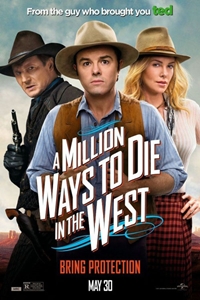 A Million Ways to Die in the West
A Million Ways to Die in the West
Starring Seth MacFarlane, Charlize Theron, Amanda Seyfried, Neil Patrick Harris, Giovanni Ribisi, Sarah Silverman, and Liam Neeson
Directed by Seth MacFarlane
Rated R
Run Time: 116 minutes
Genre: Comedy/Western
Opens May 30th
By Eric Forthun of Cinematic Shadows
A Million Ways to Die in the West isn’t really a Western or even a satire of a Western, but more of an uneven critique of the American West and the myth surrounding it. The film is Seth MacFarlane’s second theatrical feature after 2012’s successful Ted, a merging of MacFarlane’s television talents and a genuine display of visual humor and heart. His latest effort showcases the abilities of the filmmaker to bring together a terrific ensemble and repeat jokes as if we did not hear them the first few times. It’s a staple of his humor, though, something that his non sequiturs on Family Guy accentuate. He’s not a particularly revolutionary comedian. Yet he’s always been funny when exploring the most absurd aspects of stories: the concept of a boy’s wish being extended to adulthood in Ted, a protagonist as angry, hostile, and conservative as the one in American Dad, and having bears as neighbors in The Cleveland Show. With Million Ways, he shows the deadly nature of the old West and debunks the myth that the West was a haven of success for everyone.
Cut to 1882 Arizona, where Albert Stark (Seth MacFarlane) is an incompetent sheep farmer that is too meek and passive for his own good. His girlfriend, Louise (Amanda Seyfried), breaks up with him because she wants some time to herself and, now that the life expectancy is around 35, a girl doesn’t have to get married right away. She starts up a relationship with Foy (Neil Patrick Harris), a mustachioed man who has a lot of wealth due to his mustache parlor. Albert, a jealous man, foolishly challenges Foy to a duel in hopes of winning Louise back, but he cannot shot a gun and knows he is doomed. So he enlists the help of Anna (Charlize Theron), a new woman in town who spends time away from her husband, Clinch (Liam Neeson), an outlaw taking advantage of newly found gold. A supporting plot also follows Albert’s best friend, Edward (Giovanni Ribisi), who is in love with a prostitute named Ruth (Sarah Silverman), yet their love has never been consummated.
The story is ripe for satire and occasionally handles its opportunities well. A strange conversation about kids playing with “stick wheel” leads to a mirror of children and technology in our age. The idea that Edward and Ruth are saving themselves for marriage because they are Christians and want to honor the lord’s wishes is hilarious considering every time they mention it, Ruth leaves to engage with a customer. The concept of a mustache acting as a true sign of manliness and status in society while everyone else stands inferior is ridiculous. Anna responding sarcastically when Clinch says that women must love and obey their husbands demonstrates a clear societal problem that the film revisits. Yet no matter how many times the film addresses these concepts, it often repeats the jokes for increasing effect but never delivers new laughs. Most of the humor that lies within the film originates from revisiting a joke made previously in the film and putting a twist on it. MacFarlane has a knack for beating jokes into the ground, no matter how funny they originally were, and he does that here.
The film often mistakes vulgarity and gross-out humor for exciting storytelling. There’s little imagination left to the audience: a joke about a sheep dealing with mental retardation is enough, but the mention of said sheep going on the roof and then seeing it on the roof a couple minutes later lessens the impact. Wouldn’t a joke about Albert’s poor herding naturally lead into a sheep being on the roof? I feel like some jokes would work better if the writers spent more time spitting out ideas. There are instances where a character poops into a hat, a character looks in horror at sheep penises, a man gets gored by a bull, an ice block falls on a man, and a character makes a joke about a woman being hairy in a certain spot. Yet what makes these jokes insufferable is the nature of repeating the joke and showing the audience exactly how the joke looks; there’s nothing to give the audience in terms of creativity and verbal prose. MacFarlane tends to do this through many of his works, some more effectively than others.
The performances are committed and the cameos are worthwhile. SIlverman and Ribisi in particular seem to be having a blast with their material since it is the most ripe for commentary, but MacFarlane feels a bit out-of-place in the lead role. He’s a much better off-screen presence when he can focus more on creative direction and writing, yet here he feels like a misplaced emotional anchor for a film that needs it. The story attempts to balance a respectable amount of drama with its comedy, but it never gels into a coherent narrative. The satire never works with the bouts of slapstick humor, and the drama never feels grounded in enough human emotion to work. The elements of the West being a cesspool of death and chaos work perfectly for the narrative, with MacFarlane delivering a great monologue about doctors, mayors, wild animals, diseases, and everything else that doesn’t work in the West. There’s a story to be told here, and it’s admirable to see MacFarlane hoping to achieve the level of success that Mel Brooks did with Blazing Saddles, a far funnier and smarter film. But for a new visit to the Western, it’s never funny or inventive enough to work as a unique story.









